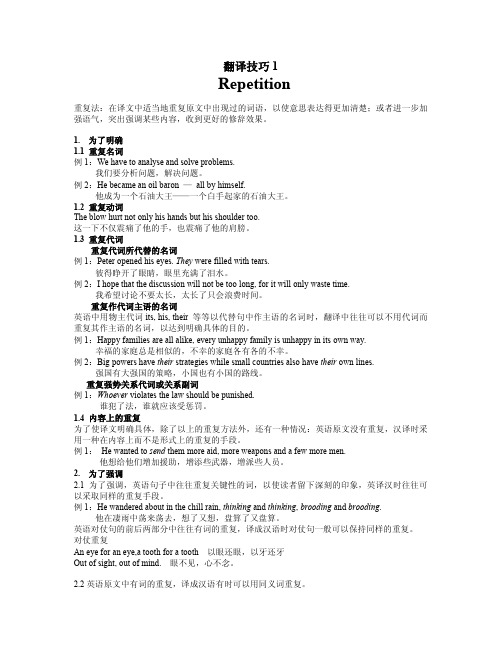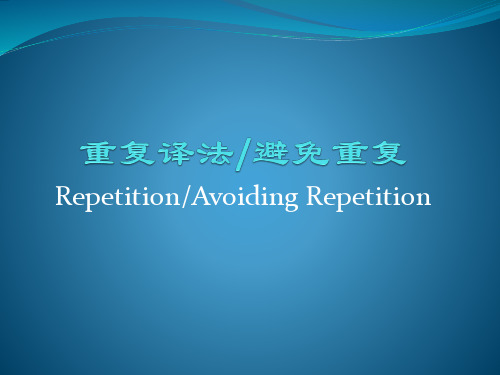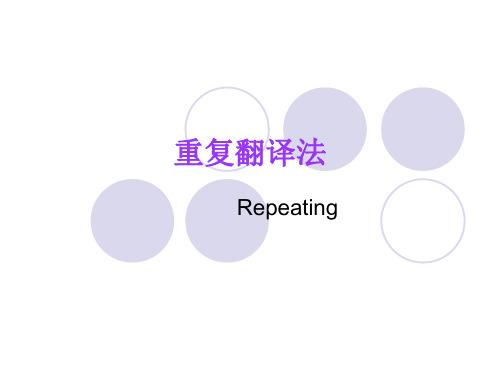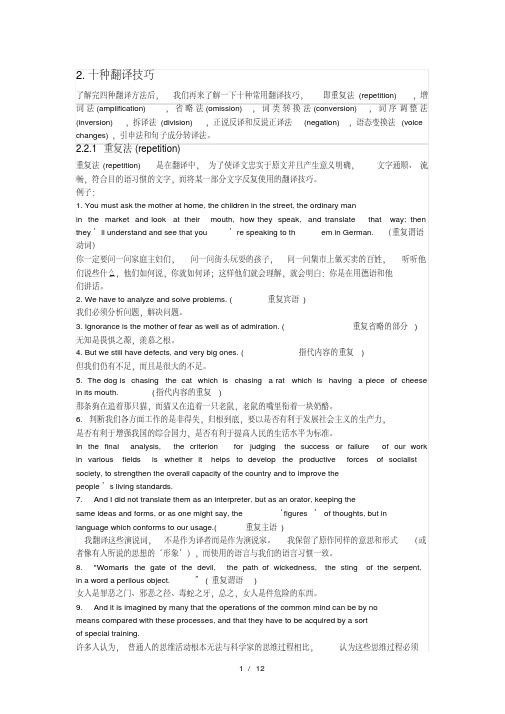常用翻译技巧——重复法
重复法Repetition

翻译技巧1Repetition重复法:在译文中适当地重复原文中出现过的词语,以使意思表达得更加清楚;或者进一步加强语气,突出强调某些内容,收到更好的修辞效果。
1.为了明确1.1重复名词例1:We have to analyse and solve problems.我们要分析问题,解决问题。
例2:He became an oil baron—all by himself.他成为一个石油大王——一个白手起家的石油大王。
1.2重复动词The blow hurt not only his hands but his shoulder too.这一下不仅震痛了他的手,也震痛了他的肩膀。
1.3重复代词重复代词所代替的名词例1:Peter opened his eyes.They were filled with tears.彼得睁开了眼睛,眼里充满了泪水。
例2:I hope that the discussion will not be too long,for it will only waste time.我希望讨论不要太长,太长了只会浪费时间。
重复作代词主语的名词英语中用物主代词its,his,their等等以代替句中作主语的名词时,翻译中往往可以不用代词而重复其作主语的名词,以达到明确具体的目的。
例1:Happy families are all alike,every unhappy family is unhappy in its own way.幸福的家庭总是相似的,不幸的家庭各有各的不幸。
例2:Big powers have their strategies while small countries also have their own lines.强国有大强国的策略,小国也有小国的路线。
重复强势关系代词或关系副词例1:Whoever violates the law should be punished.谁犯了法,谁就应该受惩罚。
英汉翻译技巧——重复译法

英汉翻译技巧——重复译法使用重复法的目的主要有三个:一是使意义明确,二是使译文生动活泼,三是加强语势。
一、使意义明确1.重复名词1) We should learn how to analyze and solve problems.2) It is our duty to rebuild and defend our homeland.3)A good play serves to educate and inspire the people.4)It was he who first repudiated and breached the understanding.5)All of these arrangements were a prelude to the ball, the hostess' ultimate prize.6)They slipped out into the open,avoiding the kitchen, a spacious separate building.2.重复动词1)People forget your face first, then your name.2)Then he spoke of the rise of charity and popular education, and in particular of the spread of wealth and work.3)They talked of things they longed for ─ of meat and of hot soup and of the richness of butter.4)He encouraged this bumptious young ma n to write of his own region──of its bleak poverty and of its women old before their time.3.重复代词1)The country has its romantic feeling.2)However you travel, it’ll take you at least two days.3)Whoever works hard will be respected.4)Choose whatever you like.5)Ignoring a problem does not solve it.6)When her eyes looked up, they were very large, odd, and attractive.二、使译文生动活泼1)grotesque2)careless3)in chaos4)street gossip5)rumors6) Talking and laughing, running and jumping, the children had a good time at sea-side.7) But at that time, she was the only woman there.8) His folks ate up everything he had.三、加强语势1) Would you please please please please please please please stop talking.2)Any my poor fool is hanged. No, no, no life.。
英汉翻译--3翻译技巧-重复与避免重复

四. 省去作主语的人称代词
英语中通常每句都有主语。人称代词作主语时,重复出现,但 根据汉语习惯,但前句出现一个主语且后句仍为同一主语时, 后句主语一般省掉,符合汉语的表达习惯。如:
But it’s the way I am, and try as I might , I haven’t been able to change it.
省去冠词
英语有冠词,汉语没有冠词;因此,英译汉时往往要将冠词省略。相反,汉译英 时,多要增加冠词,也就是增译法中的增加冠词。如:
A teacher should have patience in his work. 当老师的应当有耐心。(省略表示类别的不定冠词A) A square has four angles.
一. 省去物主代词 Put your hat on your head. 把帽子戴上。
In my childhood I learned a great deal about Russia.
童年时,我就听到许多关于俄国的事情。
He put his into his pockets, shrugged his shoulders and went his way.
正方形有四个角。
A book is useful.
书(是)有用(的)。 A camel is much inferior to an elephant in
strength. 骆驼的力气远不如大象。
略: The horse is a useful animal. /The crocodile is a
Repetition/Avoiding Repetition
12.翻译技巧之重复法

汉语重复表达的特点
4. 汉语缺乏与英语相像的关系代词、关系副词等一类 汉语缺乏与英语相像的关系代词、 的组合手段,所以汉语句子不宜太长。 的组合手段,所以汉语句子不宜太长。汉语里一个 复杂思想,往往分成几个短句来表达。 复杂思想,往往分成几个短句来表达。各短句之间 的关系,有时靠“意合” 有时靠重复。 的关系,有时靠“意合”,有时靠重复。这样才能 承上启下,衔接自然。 承上启下,衔接自然。 他这样教发音简直是误人子弟,误人还误得不浅。 他这样教发音简直是误人子弟,误人还误得不浅。
Television receiver, television, television set, TV, TV set, boob tube, telly, goggle box, idiot box
英语回避重复的主要方法
3.省略法: 省略法: 省略法 即删去句中相同的词语来回避重复。 即删去句中相同的词语来回避重复。 I like strong tea, I suppose weak is better for you. They are not known to retreat. They never have and never will. A: Would you like to go with me, B: Yes, I’d like to. this orange is ripe. I know from its color.
汉语重复表达的特点
1.汉语第三人称“他”、”她“、”它“发音相同。 汉语第三人称“ 发音相同。 汉语第三人称 汉语很少使用指物的“ 而是习惯重复原词, 汉语很少使用指物的“它”,而是习惯重复原词, 或借助指示代词。 或借助指示代词。 2.汉语有一种连锁句,其中很多需要重复词语。 汉语有一种连锁句,其中很多需要重复词语。 汉语有一种连锁句 有什么吃什么,有米饭吃米饭,有馒头吃馒头。 有什么吃什么,有米饭吃米饭,有馒头吃馒头。 3. 汉语的选择疑问句常常需要重复动词。 汉语的选择疑问句常常需要重复动词。 努力提高呢?还是努力普及呢? 努力提高呢?还是努力普及呢?
重复翻译法

Repetition of Verb
英语中一个动词常跟几个宾语或表语,汉译 时往往重复这个动词。 e.g. Is he a friend or an enemy? — 他是朋友还是敌人呢? e.g. They talked about about his family, about his work and about his future. — 他们谈到他的家庭,(谈到)他的工作, 还谈到他的前程。
Repetition of Noun
n.+substitute 英语第二次提到讲过的事物时习惯用代替词表 示替代,汉语则重复原词。这里的代替词包括 物主代词,不定代词,指示代词,同义词,the same, so, do(as), etc. e.g. Jack kicked the ball to Henry and Henry kicked it back to Jack. — 杰克把球踢给亨利,亨利又(把球)踢回给 杰克。
e.g. My room is lighter than the one next door. — 我的屋子比隔壁的屋子亮。 e.g. If you need any more money, you must get some out of the bank; there is hardly any in the house. — 假如你还需要钱,就得去银行取些出来, 家里没多少钱了。 e.g. The best watches are those made in Switzerland. — 最好的表是瑞士表。 e.g. Happy families also have their own troubles. — 幸福的家庭也有幸福家庭的苦恼。
运用对仗
英语对仗句式前后两部分常有词的重 复,译成汉语时应尽可能保持同样词的重 复。 e.g. Eye for eye, tooth for tooth. — 以眼还眼,以牙还牙。 e.g. Out of sight, out of mind. — 眼不见,心不念。
翻译的八种技巧

conceit makes one lag behind.
11
4. 交出翻译之前,必须读几遍,看看有没有要修改 的地方. 这样你才能把工作做好。 Before handing in your translation, you have to read it over and over again and see if there is anything in it to be corrected or improved. Only thus can you do your work well.
no peace. ❖ 先生们尽管可以高呼和平,和平!但是依然没有和
平。 ❖ Nels had it all written out neatly. ❖ 纳尔斯把它写得清清楚楚。
5
1. 这种人闹什么东西呢?闹名誉,闹地位,闹出风头。 What are they after? They are after name, after position, and they want to cut smart figure.
2. 大(家庭)有大(家庭)的难处。 A large family has its difficulties.
3. 天苍苍,野茫茫,风吹草低见牛羊。 The sky is blue, blue; And the steppe wide, wide; Over grass that the wind has battered low; Sheep and oxen roam.
How hard to calm the heart!
(译文2)
翻译常用的八种技巧

翻译常用的八种技巧1.增译法、增词法:amplification2.重译法、重复法:repetition3.省译法、减词法:omission4.词性转换法、词类转移法:conversion5.正说反译、反说正译法:negation6.语态变换法:the change of the voices7.分译法、分句法(OPP:合句法):division8.语序调整法、词序调整法(顺序法与逆序法)inversion增词法译文中添加一些原文没有的词句,表面上看似不忠实于原文,但仔细分析就会发现这些增加的词句所表达的意思并非无中生有,而是隐含在原文中的。
要知道,从一种语言文字向另一种语言文字转换,有时可以找到一种语言文字在另一种语言文字中的对等词,然而要想全部依赖对等词的转换来达到翻译的目的是几乎不可能的。
不同语言文字所持有的习惯决定了必须根据其中一种语言文字的习惯来适当地增词(或减词)达到语言交际的目的。
如果机械地按照字面意义直译,不仅不能表达原文的思想,精神与形象,而且还会使译文前后矛盾,闹出笑话。
例1 听到你平安的消息,非常高兴!译文: I was very glad on hearing that you were in safety!例2对不起,打扰一下!译文: Excuse me for interrupting you!(增补作宾语的代词you)例3 Histories make men wise; poems witty; the mathematics subtle; natural philosophy deep; moral grave; logic and rhetoric able to contend.译文:读史使人明智,读诗使人灵秀,数学使人周密,科学使人深刻,伦理使人庄重,逻辑修辞之学使人善辩。
(译文中添补了谓语和宾语:增词法;重译法)例4:We won’t retreat, we never have and never will.译文:我们不后退,我们从来没有后退过,我们将来也绝不后退。
翻译技巧

2.十种翻译技巧了解完四种翻译方法后,我们再来了解一下十种常用翻译技巧,即重复法(repetition),增词法(amplification),省略法(omission),词类转换法(conversion),词序调整法(inversion),拆译法(division),正说反译和反说正译法(negation),语态变换法(voice changes),引申法和句子成分转译法。
2.2.1重复法(repetition)重复法(repetition)是在翻译中,为了使译文忠实于原文并且产生意义明确,文字通顺、流畅,符合目的语习惯的文字,而将某一部分文字反复使用的翻译技巧。
例子:1. You must ask the mother at home, the children in the street, the ordinary manin the market and look at their mouth, how they speak, and translate that way; then they’ll understand and see that you’re speaking to th em in German. (重复谓语动词)你一定要问一问家庭主妇们,问一问街头玩耍的孩子,问一问集市上做买卖的百姓,听听他们说些什么,他们如何说,你就如何译;这样他们就会理解,就会明白:你是在用德语和他们讲话。
2. We have to analyze and solve problems. (重复宾语)我们必须分析问题,解决问题。
3. Ignorance is the mother of fear as well as of admiration. (重复省略的部分) 无知是畏惧之源,羡慕之根。
4. But we still have defects, and very big ones. (指代内容的重复)但我们仍有不足,而且是很大的不足。
- 1、下载文档前请自行甄别文档内容的完整性,平台不提供额外的编辑、内容补充、找答案等附加服务。
- 2、"仅部分预览"的文档,不可在线预览部分如存在完整性等问题,可反馈申请退款(可完整预览的文档不适用该条件!)。
- 3、如文档侵犯您的权益,请联系客服反馈,我们会尽快为您处理(人工客服工作时间:9:00-18:30)。
7
1
重复(Repetition)重复(Repetition) 重复(Repetition)重复(Repetition) 重复(Repetition)重复(Repetition) 重复(Repetition)重复(Repetition) 重复(Repetition)重复(Repetition) 重复(Repetition)重复(Repetition)
这属于谓语动词的重复形成排比句。
7
4
例2.It is customary(往往) for adults to forget how hard and dull and long school was.
成年人往往忘了当年上学的日子多艰苦,多乏味,
多漫长。
副词重复形成排比结构。
7
5
A: 听说当年XXX是你的女神?
7 2
汉语常使用重复修辞,形 成大量的平行对偶结构; 而英语则常设法减少重复。
7 3
例1.May is open windows and lilac(丁香) perfume
on the breeze and bees humming at tulips(郁金香).
五月是敞开的窗户,是微风送来的丁香的芬芳,是郁 金香丛中蜜蜂嗡嗡的欢唱。
7 7
B:她长得又好,人又好,又聪明,谁 会不喜欢?
She is so pretty, so nice and so smart.
后面两个so要好还是不要好?
7 6
See the pretty girl in that mirror there: Who can that attractive girl be? Such a pretty face, Such a pretty dress, Such a pretty smile, Such a pretty me!
